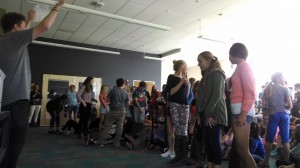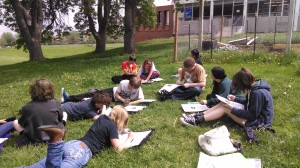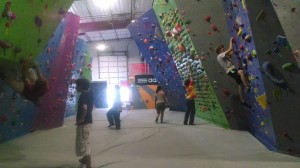An action project in CAP (Community Adventure Program) is when we choose a local environmental issue to focus on and make a difference within our school and community. Our class’ topic was planned obsolescence. Planned obsolescence is the process of industries designing and manufacturing their products to fail after a couple of years of use, also known as products being “designed for the dump”. The goal of this type of production is to ensure that people buy a product multiple times rather than once. This triggers demand for an industry’s products because consumers have to keep coming back again and again. Companies often make it difficult and more expensive to repair broken or worn-out items, so people would rather re-buy a product than repair it.
Another type of planned obsolescence is perceived obsolescence. Perceived obsolescence primarily represented through products like phones and clothes; they are sold and desirable for aesthetic reasons. The idea that we have to buy and buy and buy stems from classic capitalist consumerism. We buy so much for no reason! It just makes corporations more money.
There are many severe human health and environmental repercussions to planned obsolescence. For example, the products that are made in foreign countries have to be shipped overseas to us use fuel, which emits greenhouse gases and contributes to air pollution and climate change. The way we dispose of electronic waste and other products negatively affects both the environment and humans. Our electronic waste ends up in poor parts of foreign countries, where people risk their health and lives to take apart electronics with their bare hands. The chemicals in the waste also leach into the earth, polluting water and the local environment.

We hope that the video deeply impacted others. Here’s what some of the student’s in our CAP class have to say:
“Studying this topic was so interesting and educational to me; I learned about things I had never learned about before. It also made me more aware of how I dispose of my old things. My mom and I are actually planning on taking a trip to the CHaRM Facility soon, to recycle anything we can… PROPERLY!” – Nicolette Gordillo-LaRiviere
“The action project informed me about different environmental issues…I had vague knowledge about the idea of e-waste before the action project, but I was not aware as to the extent that companies intentionally design an inferior product. It’s more knowledge like this that affects my everyday life and influences my actions. Instead of throwing away a pair of broken headphones, or even non-broken ones, I’ll use them until they can’t be used anymore, and recycle. I’ll encourage others to recycle. It won’t even bother me if I become ‘that planned obsolescence girl’.” – Ashley Aguilar
“I really enjoyed learning about planned obsolescence and everything it affects, from smartphones to computers to socks. I also found the process of filming, planning, and editing the video to be a very interesting and challenging experience, but very rewarding to see the final project. Visiting the CHaRM facility and getting to see how much e-waste we produce has really opened my eyes up to the massive waste the average human produces over their lifetime, and the environmental impacts of that waste.” – Brewer Briggs
Written by Nicolette Gordillo-LaRiviere, Edited by Katie Craig



Leave a Reply